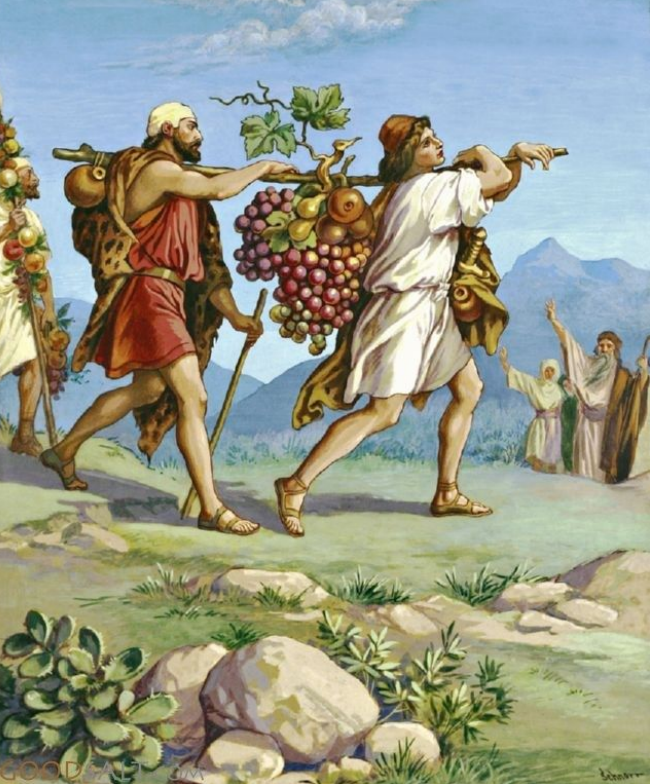The world was created for you, the Jewish people. * When we are grateful for what we have been blessed with, we celebrate openly before Hashem.
By Rabbi Boruch Merkur

“Chosen People” may seem like an audacious title for a nation so persecuted throughout history. Yet we are promised consolation for all the tragedy and hardship we’ve suffered. A world of eternal peace, of reward and prosperity, awaits each Jew - and the Rebbe insists that this redemption is unfolding now before our eyes.
Ultimately the most spectacular victory will be celebrated – not in some distant Heaven, but - specifically in the material world, G-d’s dira ba’tachtonim. In simple terms this means that each Jew will be incredibly wealthy and earnestly grateful. It will be natural for Jews to sing G-d’s praise, openly in public.
This describes the Mitzva of bikkurim. The first fruits are brought to Yerushalayim, to the Beis HaMikdash, and presented to the Kohanim. All those who make this joyous pilgrimage stay the night. The Holy City fills with vibrant people celebrating their success with gratitude.
The Rebbe emphasizes how bikkurim teach us how infinity – infinite success and gratitude - can be experienced within every speck of life:
The first fruits, bikkurim, must be brought “before Hashem, your Lord” laden in vessels. It was the custom of the rich to bring their bikkurim in containers of silver or gold, whereas the poor made baskets of inexpensive, organic materials.
The law is that when bikkurim “are presented in vessels made of precious metals, the Kohen takes the bikkurim and the vessels are returned to the owner. But if bikkurim are brought in baskets of willow, reeds, or the like, then the bikkurim go to the Kohanim along with the containers.”[1]
The virtue of the Jewish people - being the “first fruit, bikkurim” - is most pronounced when they embody this symbol of selection, of being chosen, the “first fruits.” That is, when Jews are recognized as bikkurim, the best, even as they exist as normal people in the world, in their very mortal veneer, a kind of “vessel,” a body that contains (even restricts) a soul.[2]
The soul is a treasure trove of wealth. Yet the restrictive, confining body (which includes the personality), doesn’t always reflect that wealth. It may seem the pauper, who simply lacks resources. But the poor man reaches deeper and adds ingenuity of design and craftsmanship to produce vessels, beautiful baskets, to contain the first fruits. These simple vessels are thus elevated to the sanctity of bikkurim, the best, to be enjoyed by the Kohanim, agents of the Sh’china.
The only thing that holds us back from realizing this promise of success and wealth is daas, our presence of mind in living with this deep truth. “There is no poverty other than in mind - ein ani eleh b’daas.”
This deep truth is embedded within the Mitzva of bikkurim:
Even the simple vessel of a pauper is identifiable as bikkurim. In fact, bikkurim must be presented in vessels, indicating that it is by dint of the container, the vessel, that they reach the level of “before G-d, your Lord.”
Vessels made of even the simplest materials (from the physical world, the lowest of all dimensions) become part of the bikkurim, to the extent that “the bikkurim go to the Kohanim along with the containers,” the vessel itself reaches the level of “before G-d, your Lord” …
Being bikkurim, the first fruit, Jews are an end unto themselves. Everything is created for them. From this it is understood that every detail in a Jew’s life (even those who have no obvious connection to Torah) - every moment in time, every point in space, every single thought, word, or action - has inherent purpose (and are not a means to an end, an intermediary to something else).
That is to say that each instance is something entirely new (in terms of the purpose of any given detail). It is thus obligatory to say, “For my sake (for the sake of this detail) the world was created.” All aspects of the world, every moment in time, etc., are thus included within a single moment.
From this it is understood that the power to reach “Each day they (Torah and Mitzvos) should be new in your eyes” (notwithstanding the fact that the person had done this avoda prior to then) is specifically within the power of a Jew (the first fruit, bikkurim).
With regard to all worldly matters, since they are not an end unto themselves, just a means to an end (“for the sake of the Jewish people and for the sake of the Torah”), it is possible that a day (and how much more so, a moment) in time can be a continuation from the avoda of yesterday or a preparation and intermediary to tomorrow. Only Jews have the power to accomplish, “Each day they should be new in your eyes,” a truly novel innovation (following the model of the daily renewal, each moment, of Creation ex nihilo through G-d Almighty Himself).[3]
*
NOTES:
[1] Rambam’s Laws of Bikkurim 3:7-8
[2] Seifer HaSichos 5751, pg. 820
[3] Ibid pg. 815